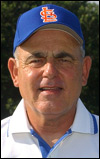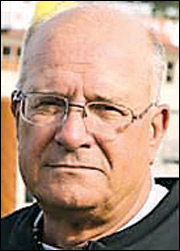‘I hope I get paid’
<< Go back
Vicknair was head football coach at Barbe High when Mike Abshire, a 1981 graduate, played for the Bucs. They next crossed paths when Abshire got his first coaching job, at Moss Bluff Middle School, a feeder of nearby Sam Houston High School in the Moss Bluff suburb of Lake Charles. Abshire helped at the high school.
“I can’t say I really helped him up there, but Coach Vic never ran anybody off,” Abshire said. “If you were up there, he was going to put you to work. As soon as I would finish my duties at the middle school, I’d go up to the high school.”

|
MIKE JOHNS
|
This was after Vicknair left McNeese after four years as an assistant coach and begin a long stay as head coach at Sam Houston High in 1986. Matt Viator, who would later become head coach at McNeese, was the offensive coordinator at Sam Houston. Mike Johns, later a head coach at LaGrange and St. Louis high schools, was defensive coordinator. They and others worked for Vicknair, and Abshire volunteered to do whatever they needed.
“I’d be a fly on the wall, but Vic never allowed that. He was going to put you to work. I’d walk in, and they’d be passing out paperwork with their coaches’ names on it, and I’d get one,” Abshire said. “I was lost in that office with him. He’d be talking about stuff, and I didn’t know what he was referring to. I didn’t even know what sport he was referring to. I just knew he was the football coach, and since I knew him for so long I knew he was all about football.
“They were leaving to go to a clinic, and he said, ‘You’re coming with us, Abshire.’ I didn’t know that we were leaving at 5 o’clock the next morning for San Angelo, Texas. I thought we were just going a couple of days. I went home that evening, and I hadn’t been married a year yet, and I told my wife I was going on a football clinic.”
She asked where, and he said, “Texas.”
That’s all he knew.
She asked how long he’d be gone, and he said, “Well, I really don’t know.”
He didn’t ask Vicknair any questions. He went home and threw some stuff in a bag. It was enough for a couple of days.
“We left Wednesday morning at 5 and came back Sunday, and at the time the speed limit was 55, so it was about a 12-hour drive,” Abshire said. “I didn’t know then, but I know now, that Vicknair was pretty much the pioneer of all the coaches going to clinics. I don’t think he missed a clinic. Ever.”
Abshire said there were 2,500 coaches at that first clinic he attended at Angelo State, and Vicknair didn’t miss a meeting. Other coaches attended some of the meetings and socialized the rest of the time, but Vicknair sat through every presentation and took detailed notes.
“I learned how helpful those clinics were, and I learned how to go to one, what to get from it and how to put it to use,” Abshire said. “I came back just in time to stop the divorce.”
This was before everyone had a cell phone, so Abshire’s bride didn’t know what had happened.
“She thought I was kidnapped,” he said.
Abshire later moved up to the high school. His wife was an alumnus, and before the promotion she had told him, “You’re going to coach right here,” meaning Sam Houston High School.
He did, at first for Vicknair, and then coming back years later to work with a different set of coaches.
“You know how you hate when they’re right?” Abshire said, referring to wives. “That was one of those times.”
Being a first-year coach and based at the middle school, Abshire didn’t know much about the logistics and school board procedure when Vicknair called and, fulfilling the prophecy of Abshire’s wife, asked Abshire to come to work for him at the high school.
“I didn’t even know if I was going to get a check,” he said. “It was pretty much that quick. We were already doing football, busy with that, and I said, ‘I hope I get paid.’
“That was that. I was on his staff.”
Complete with paycheck.
Viator had been head baseball coach, and when he left to coach football at Vinton High School, Abshire took over the baseball program at Sam Houston. Abshire and Viator grew up together, and Abshire was already helping Viator coach baseball at the high school.
“Typical of those days, the old-school football coach fought the spring programs because they’d take away from offseason football work and things like that,” Abshire said. “I’m trying to make it work together, but Vicknair would always tell me, ‘You can’t do that. Baseball’s gotta wait. Baseball’s gotta wait.’ That’s all he ever told me.
“One day I walked in the office, and his oldest son, which he referred to as No. 1, was starting to play baseball,” Abshire said. “I walked in early in the morning before school, and Vic hit me right at the door: ‘How do you throw this damn baseball?’ I said, ‘What in the hell are you talking about?’
“He said, ‘Oh, my boy wanted to throw in the yard yesterday, so I grabbed a glove and went out there, and hell, I know he’s not doing it right, but I don’t know how to do it.’ So, he wanted some coaching.”
Abshire thought about it before responding.
“Coach,” he told Vicknair, “baseball’s going to have to wait.”
Abshire laughed as he remembered Vicknair’s reaction.
“He looked at me and said, ‘You’re sorry. I knew you were going to say something.’ I said, ‘Vic, you told me all my life, even when I was in high school, that baseball’s gotta wait. Just tell him it’s gotta wait.’ I always held that against him, jokingly, and we got a laugh out of it, because here comes No. 2, his second son, and he liked baseball,” Abshire said. “I’m in the yard with him, helping him, and here comes No. 3. He loved baseball. They all did.
“I’m over there, and Vic’s cooking steaks in the back and we’re working in the yard, trying to teach them how to throw and hit a baseball. It was when they were real young, and it was funny how it all transpired with a guy that I really looked up to, and still do.”
Abshire said he thought, as a player, he knew what it would be like to coach. Then he became a coach and found out how little he knew about it.
“I realized I didn’t know what the hell was going on,” he said, “and then a guy like Charles comes along and catches me right at the beginning, thank goodness — right when you’re on the bubble of going either way or quitting and doing something else — and he gives you insight into how you need to do it.
“In my mind, I don’t know any other way now. I really don’t. I hear a lot of different other ways, and I just don’t know any other way.”
The most lasting message was to put in the necessary time and effort.
“If you lost, it wasn’t going to be because you didn’t work or you got outworked,” Abshire said. “That’s probably what everybody else has told you about Charles, but that’s just how it was.”
Years later Vicknair became an assistant coach at Sulphur High School, where Abshire was already on staff. Abshire went there to work for Viator, who left to become offensive coordinator at McNeese. Lark Hebert became head coach, and Abshire stayed as an assistant coach.
It was another chance for the pupil to needle the mentor.
“Coach Vic walked in the first day, and I knew he was getting hired,” Abshire said, “and I was going to take him around and show him where everything was. I knew it wouldn’t take a day to show him what’s going on, and he’d have it down pat, but when he walked in I had a chair next to me. I pulled the chair back and said, ‘Sit down. I’m going to teach you how to be an assistant coach.’
“I told him the first three letters in assistant are a-s-s. Don’t ever forget it.”
Vicknair laughed, but the punch line was yet to come.
“I said, ‘You old fart, you forgot: I learned that from you.’ We laughed and laughed about that,” Abshire said.

Discussion Area - Leave a Comment